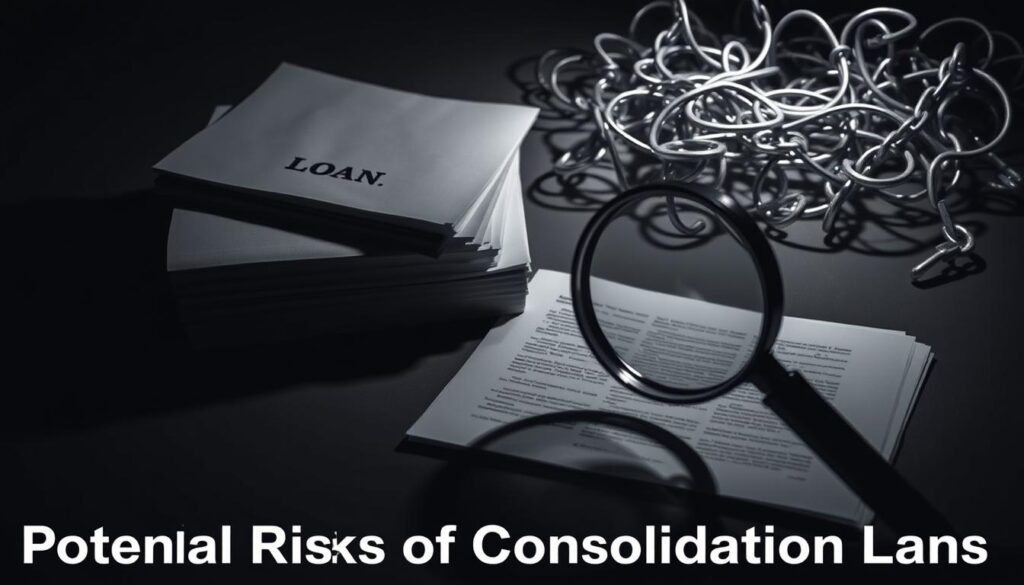Consolidate Debt with Flexible Loan Options
Did you know that nearly 30% of Americans have some form of debt? This includes credit card balances and personal loans. Managing these debts can be tough, with different interest rates and due dates to keep track of.
Dealing with multiple debts can be overwhelming. That’s why debt consolidation is a good option. It combines your debts into one loan. This can make your finances simpler and lower your monthly payments. For example, you might look into home equity loan rates to consolidate your debt.
Flexible loan options can really help. By picking the right consolidation loan, you get a single monthly payment. You might also see lower interest rates and less financial stress.
Key Takeaways
- Debt consolidation simplifies your finances by combining multiple debts into one loan.
- Flexible loan options can provide relief from high-interest rates and multiple due dates.
- Consolidating debt can potentially lower your monthly payments.
- It’s essential to explore different loan options, such as home equity loans, to find the best fit.
- Consolidating debt can reduce financial stress and make it easier to manage your finances.
What Are Consolidation Loans?
Consolidation loans help make managing your money easier. They combine several debts into one, often with a lower interest rate. This makes paying back your debt simpler.
Definition and Purpose
A consolidation loan lets you merge many debts into one. This can lower your interest rate and simplify your payments. It’s designed to make paying off debt easier and cheaper.
These loans can handle different debts like credit card balances, personal loans, and high-interest debt. By combining them, you can manage your finances better.
Types of Consolidation Loans
There are many types of consolidation loans, each with its own benefits. Here are a few:
- Personal loans: These are unsecured loans for combining various debts.
- Balance transfer credit cards: They let you move credit card balances to one card, often with a lower rate.
- Home equity loans: These use your home’s equity to consolidate debts.
| Type of Consolidation Loan | Interest Rate | Repayment Term |
|---|---|---|
| Personal Loan | 6% – 12% | 3 – 5 years |
| Balance Transfer Credit Card | 0% – 20% | 1 – 2 years |
| Home Equity Loan | 4% – 8% | 5 – 15 years |
Knowing about the different consolidation loans helps you choose the best option for your debt.
Benefits of Using Consolidation Loans
Consolidating debt can lead to financial stability. It combines multiple debts into one, making payments simpler and potentially saving on interest.
According to a source,
“Consolidating credit card debt can save you money on interest if you’re able to qualify for a lower interest rate.”
This shows the benefits of consolidation loans, mainly for those with high-interest debts.
Simplified Payments
One big plus of consolidation loans is easier payments. Instead of juggling many debts, you make one monthly payment. This makes managing your finances simpler.
Simplified payments can reduce stress and minimize the risk of missed payments, which can harm your credit score. Consolidating debts streamlines your financial management.
Potential Lower Interest Rates
Another key advantage is the chance for lower interest rates. For example, if you have many credit card debts with high rates, a single loan with a lower rate can save a lot over time.
As noted on Forbes, knowing the pros and cons of debt consolidation is important. Make sure the consolidation loan has a lower rate than your current debts.
It’s crucial to carefully review the terms of the consolidation loan to ensure it offers a favorable interest rate and repayment conditions.
How to Choose the Right Loan Option
Finding the right loan for debt consolidation can seem hard. But, with the right help, it’s easier. First, you need to know your financial situation and the loan options out there.
Evaluating Your Financial Situation
Before you apply for a consolidation loan, check your finances. You should know your total debt, credit score, and how much you earn and spend. This helps you figure out how much you need to borrow and how to pay it back.
Key factors to consider when evaluating your financial situation include:
- Total debt amount
- Credit score
- Income stability
- Monthly expenses
Comparing Lenders and Terms
After you know your finances, compare different lenders and their offers. Look at interest rates, fees, and how long you’ll pay back the loan. Also, check the lender’s reputation and customer service.
A comparison of loan offers can be simplified by creating a table like the one below:
| Lender | Interest Rate | Fees | Repayment Period |
|---|---|---|---|
| Lender A | 6.99% | $100 origination fee | 5 years |
| Lender B | 7.99% | No origination fee | 7 years |
| Lender C | 5.99% | $200 origination fee | 3 years |
By looking at your finances and comparing loans, you can pick the best consolidation loan. This loan should help you meet your financial goals.
When picking a personal loan for debt consolidation, think about the short and long-term effects. Understand how the loan will impact your credit score and overall financial health.
The Application Process for Consolidation Loans
Applying for consolidation loans is a key step in managing your debt. It involves several important steps. These steps help lenders check if you qualify and make the transition to debt consolidation smooth.
Required Documentation
To apply for a consolidation loan, you’ll need to provide some documents. You’ll need proof of income, like pay stubs or tax returns. You’ll also need identification documents, such as a driver’s license or passport.
Lenders might ask for bank statements to see if you’re financially stable. They’ll also want details of your existing debts. This includes how much you owe and to whom.
“The application process for consolidation loans typically requires documentation such as proof of income and identification,” financial experts say. Having these documents ready can make the application process easier.
Steps to Apply
The application process for consolidation loans can be broken down into simple steps:
- Step 1: Research and Compare Lenders – Find lenders that offer consolidation loans with good terms.
- Step 2: Gather Required Documents – Make sure you have all the necessary documents before you start.
- Step 3: Submit Your Application – Fill out the application form correctly, providing all the required information.
- Step 4: Review and Accept the Loan Offer – If approved, review the loan terms carefully before accepting.
By following these steps and being prepared with the necessary documents, you can easily apply for consolidation loans.
Some lenders also offer pre-approval processes. This can give you an idea of the loan amount and interest rate you might get. It doesn’t affect your credit score.
When to Consider a Consolidation Loan
Figuring out when to get a consolidation loan is key to handling your debt well. These loans merge several debts into one, with a single interest rate and payment date. This can make managing your finances easier.
To know if you need a consolidation loan, look for certain signs.
Signs You Need Consolidation
If you’re dealing with any of these, it might be time for a consolidation loan:
- You’re having trouble keeping up with multiple debt payments each month.
- It’s hard to pay more than the minimum on your debts.
- Debt stress is getting to you.
- Creditors or collection agencies are calling you.
- You’re thinking about using credit cards or other loans to pay off what you owe.
These signs mean your debt is hard to handle. Consolidation could help.
Weighing the Pros and Cons
Before you decide, think about the good and bad sides of consolidation loans.
Pros:
- One payment a month makes things simpler.
- You might get a lower interest rate, depending on your credit score.
- Managing one loan is less stressful than many.
Cons:
- Even with lower monthly payments, the total cost could be higher.
- Without spending control, you might get into more debt.
Considering these points will help you decide if a consolidation loan is for you.
Potential Risks of Consolidation Loans
It’s important to know the risks of consolidation loans before you decide. These loans can make your finances easier to manage. But, they also have risks that you need to handle with care.
Getting all your debt into one loan might sound good. But, think about the downsides. For example, debt consolidation loans can mean longer to pay off. This might mean you pay more interest over time.
Overextending Your Budget
One big risk of consolidation loans is spending too much. Consolidating debt into one loan with a lower monthly payment can be tempting. You might think you can spend more on credit cards or other loans.
This can start a cycle where you have more debt than before. It can hurt your financial health. It’s key to have a budget that includes your new loan payments and avoids new debt.

Impact on Your Credit Score
Another risk of consolidation loans is how they can affect your credit score. Applying for a consolidation loan means a hard inquiry on your credit report. This can lower your score for a while.
Also, missing payments on your consolidation loan can hurt your credit score. It’s vital to pay on time and check your credit report. This way, your consolidation loan won’t harm your credit score.
Knowing these risks and managing your consolidation loans well can help avoid financial harm. It can lead to a more stable financial future.
Alternatives to Consolidation Loans
Consolidation loans can help, but they might not fit everyone’s needs. It’s important to know other ways to handle debt. This can depend on your financial situation.
Two good alternatives are debt management plans and credit counseling services. They offer ways to manage debt without getting a new loan.
Debt Management Plans
A debt management plan is a repayment plan made with a credit counselor’s help. It aims to make your payments simpler and possibly lower what you owe. By combining your debts into one payment, you can better manage your money.
To start a debt management plan, you work with a credit counseling agency. They talk to your creditors for you. This can get you lower interest rates and waived fees, helping you pay off debt faster.
Credit Counseling Services
Credit counseling services give you expert advice on handling your debt. They help you understand your finances, make a budget, and plan to pay off debt.
With a credit counselor, you learn about your spending and how to improve. They teach you about managing credit and avoiding debt in the future.
For more on debt consolidation alternatives, check out Experian’s guide. It offers more ways to manage your debt.
In summary, while consolidation loans are common, debt management plans and credit counseling services offer personalized ways to achieve financial stability.
Frequently Asked Questions About Consolidation Loans
For those feeling overwhelmed by multiple debts, consolidation loans can be a big help. Many questions come up when thinking about this financial tool.
How Much Can I Save?
One big worry is how much you can save. Consolidating debts into one loan can lower your interest rate and monthly payments.
For example, if you have several credit cards with high interest, combining them into one loan with a lower rate can save you money. This is because you pay less in interest over time.
| Debt Type | Interest Rate | Monthly Payment |
|---|---|---|
| Credit Card A | 20% | $200 |
| Credit Card B | 18% | $150 |
| Consolidation Loan | 12% | $300 |
Is a Consolidation Loan Right for Me?
Deciding if a consolidation loan is right for you depends on several things. These include your financial situation, credit score, and debt.
To decide wisely, think about these:
- Your current interest rates and monthly payments
- The interest rate and terms of the consolidation loan
- Your credit score and history
It’s also key to look at your spending habits and plan to avoid new debt.

By carefully looking at these points and thinking about your options, you can decide if a consolidation loan is right for you.
Conclusion: Taking the Next Steps
Managing multiple debts can be tough. But, consolidation loans offer a way out. They combine all your debts into one loan. This makes it easier to handle your finances and might even lower your interest rates.
Effective Repayment Strategies
Creating a solid repayment plan is key. First, look at your finances and set a realistic payment schedule. Stick to your payments to move closer to being debt-free.
Expert Guidance for Debt Consolidation
Getting help from a financial advisor can make a big difference. They can guide you in picking the best consolidation loan. Their advice helps you create a plan that works for you, making debt consolidation easier and more effective.









